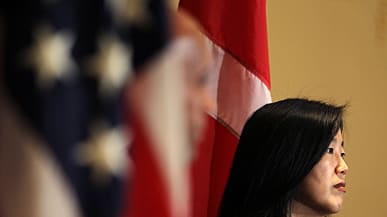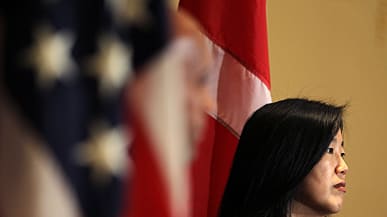The corporate education reform movement has had no more visible star than Michelle Rhee, the former chancellor of the District of Columbia Public Schools. After she left office last fall, she formed a new political organization to raise $1 billion to advocate for the changes she believes in. She has been advising some of the nation's most conservative governors to fight the teachers' unions and rely on standardized tests to fire or reward teachers.
Her credibility was her alleged success in lifting up test scores in the low-performing public schools of the nation's capitol during her nearly four years in charge.

Now, however, that credibility has been directly challenged by revelations of possible widespread test fraud in the D.C. schools while she was in charge. An article in USA Today reveals that more than half the public schools in D.C. were found to have an unusual number of erasures on standardized tests of reading and math.
The school at the center of the investigation is the Crosby S. Noyes Education Campus, which saw spectacular score gains during Rhee's tenure. Rhee held up the school as a model because the percentage of students who reached proficient on D.C. tests soared from 10 percent to 58 percent in a two-year period. The school was her example of what could happen as a result of her policies. In its recruitment advertisements, the District school system identified the school's principal, Wayne Ryan, as one of its "shining stars." Rhee twice showered bonuses on the school's staff, with $10,000 for the principal and $8,000 for each teacher.
A computer analysis of erasures found a dramatic pattern of changing answers from wrong to right at Noyes. In one seventh grade classroom, students averaged 12.7 wrong-to-right erasures on the reading test, as compared to a district-wide average of less than 1. When parents complained that their children's high scores didn't make sense, since they were still struggling to do basic math, they were ignored.
What will this revelation mean for Rhee's campaign to promote her test-driven reforms? Her theory seemed to be that if she pushed incentives and sanctions hard enough, the scores would rise. Her theory was right, the scores did rise, but they didn't represent genuine learning. She incentivized desperate behavior by principals and teachers trying to save their jobs and meet their targets and comply with their boss' demands.
Her celebrity is not built on her success in D.C., however, which now appears to be a chimera.
Rhee's advocates point out that D.C. scores went up on the National Assessment of Educational Progress, the federal test. This is true, but the gains under Rhee were no greater than the gains registered under her predecessor Clifford Janey, who did not use Rhee's high-powered tactics, such as firing massive numbers of teachers.
Almost from the day she arrived in her job in D.C., Rhee has been a magnet for publicity and controversy. She has been on the cover of Time and Newsweek, has appeared innumerable times on national television, and was one of the stars of the pro-privatization film Waiting for Superman. She is truly an education celebrity.
Her celebrity is not built on her success in D.C., however, which now appears to be a chimera.
Her celebrity results from the fact that she has emerged as the national spokesman for the effort to subject public education to free-market forces, including competition, decision by data, and consumer choice. All of this sounds very appealing when your goal is to buy a pound of butter or a pair of shoes, but it is not a sensible or wise approach to creating good education. What it produces, predictably, is cheating, teaching to bad tests, institutionalized fraud, dumbing down of tests, and a narrowed curriculum.
This formula, which will be a tragedy for our nation and for an entire generation of children, is now immensely popular in the states and the Congress. Most governors embrace it. The big foundations endorse it. The think tanks of D.C., right-wing and left-wing, support it. Rhee helped to make it fashionable. If she doesn't pause to consider the damage she is doing, shame on her. If our policymakers don't stop to reflect on the damage they are doing to public education and to any concept of a good education, then our nation is in deep trouble.
Diane Ravitch is the author, most recently, of The Death and Life of the Great American School System: How Testing and Choice Are Undermining Education (Basic).

